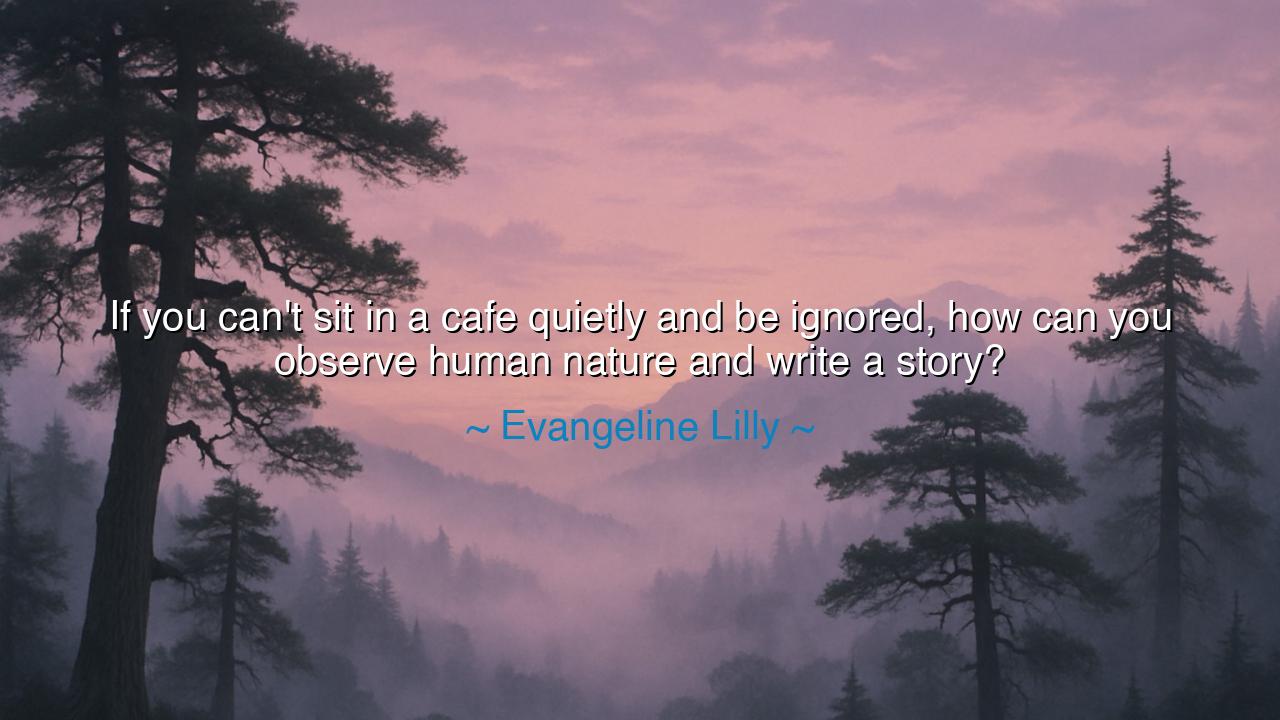
If you can't sit in a cafe quietly and be ignored, how can you
If you can't sit in a cafe quietly and be ignored, how can you observe human nature and write a story?






Hearken, O seekers of truth and wisdom, to the words of Evangeline Lilly, who illumines the subtle art of understanding the human heart: “If you can’t sit in a cafe quietly and be ignored, how can you observe human nature and write a story?” In these words lies a lesson as ancient as the chronicles of civilization itself: to perceive the world with clarity, one must first learn the art of patience, stillness, and unobtrusive attention. The observer becomes a mirror to life, capturing its movements, its follies, and its quiet glories.
Lilly’s insight reminds us that the artist’s craft is born not in the clamor of self-expression, but in the silence of watchfulness. To sit unnoticed is to see the world as it truly is, without pretense or performance. The stories that endure, that resonate across generations, are those shaped by the careful observation of the subtle rhythms of human behavior—the whispered gestures, the fleeting glances, the silent conflicts and joys that escape the hasty or impatient eye. Here, the act of being ignored is a sacred tool, a means by which the soul may truly perceive.
Consider the great playwright Anton Chekhov, who wandered the streets of Moscow and St. Petersburg, observing the lives of ordinary men and women with quiet devotion. In cafes, parks, and on trains, he absorbed the speech, the posture, the gestures of countless souls, translating these glimpses into stories that reveal the depths of human nature. Chekhov understood that to write authentically, one must first watch attentively, letting the world unfold in its natural cadence, unseen and unobserved. Only then can the artist transform observation into enduring art.
The essence of Lilly’s teaching is that true understanding requires humility and restraint. The writer—or indeed any observer of life—must resist the urge to impose themselves upon the world, to interrupt, to perform, or to demand attention. In the act of being ignored, one becomes a vessel for observation, a silent witness to the intricate interplay of desire, fear, ambition, and folly that defines humanity. Patience, she teaches, is the gateway to insight; stillness is the crucible of clarity.
In our own lives, this principle extends beyond the craft of writing. To understand colleagues, neighbors, or even oneself, one must cultivate the ability to listen, observe, and reflect without intrusion. History offers countless examples: the philosopher Plutarch, who chronicled the lives of men and women with extraordinary empathy, first absorbed their deeds, their habits, and their dispositions before committing their stories to posterity. Through such attentive observation, wisdom passes from age to age, illuminating the patterns of human character.
Even amidst the distractions of modernity, there is profound power in quiet contemplation. To sit in a café, a park, or a public square, unnoticed, is to enter a state of heightened awareness. The smallest gestures—the tightening of a hand, the tone of a laugh, the hesitation before a word—become teachings in themselves. Evangeline Lilly reminds us that the story of life is written not in haste or self-assertion, but in patient, discerning attention to the ordinary and the overlooked.
O children of reflection, hear this and take it to heart: cultivate the patience to be still, the humility to be unnoticed, and the sensitivity to perceive what is fleeting and subtle. Let the quiet observation of the world guide your craft, your relationships, and your understanding of the human soul. In this practice, the ordinary becomes extraordinary, the mundane becomes instructive, and the truth of human nature is revealed in its full, intricate glory.
Thus, let every moment of silence be a teacher, every unobserved gesture a lesson, and every act of quiet contemplation a window into the human condition. Learn to sit unnoticed, O seekers, and in this stillness, write your stories, shape your wisdom, and cultivate insight that endures beyond fleeting noise and ephemeral acclaim. For it is in the patient observation of life that the soul finds its richest narrative, and the artist finds the truth that sustains the ages.
If you wish, I can also create a practical guide for observing human nature and turning daily life into compelling stories inspired by Lilly’s wisdom. Do you want me to do that?






AAdministratorAdministrator
Welcome, honored guests. Please leave a comment, we will respond soon